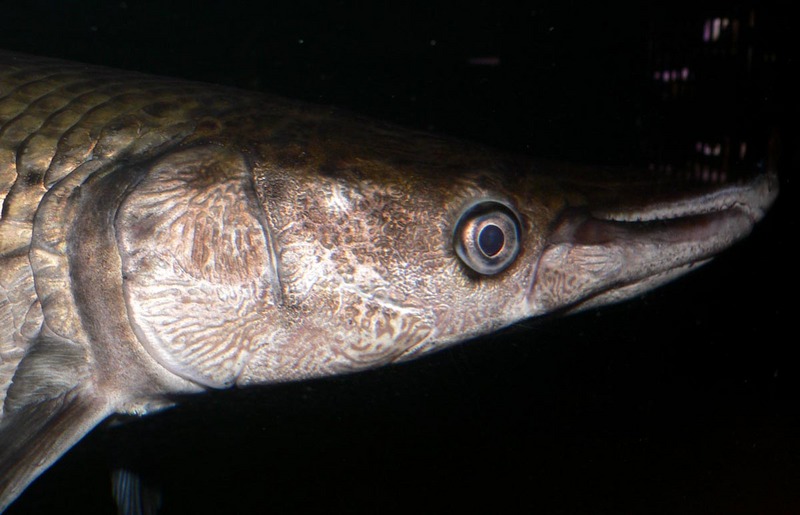|
| 질의: the aquarium | 결과: 111번째/721 | |
Alligator Gar (Atractosteus spatula) - Wiki
| 제목: | Alligator Gar (Atractosteus spatula) - Wiki
| |

| 해상도: 1200x772
파일크기: 131154 Bytes
촬영일: 2005:06:06 12:08:18
사진기: DMC-FZ20 (Panasonic)
F number: f/2.8
Exposure: 10/600 sec
Focal Length: 60/10
등록시간: 2007:08:14 01:08:50
|
Alligator gar
From Wikipedia, the free encyclopedia
[Photo] Photo of Atractosteus spatula (alligator gar) head at the Steinhart Aquarium in San Francisco, taken June 2005 by User:Stan Shebs http://commons.wikimedia.org/wiki/User:Stan_Shebs Date: 6 June 2005
The alligator gar, Atractosteus spatula, is a primitive ray-finned fish. It is also referred to as the gator gar. Unlike other gars, the mature alligator gar possesses a dual row of large teeth in the upper jaw. It is these remarkably alligator-like teeth which gives it its name. The dorsal surface of the alligator gar is a brown or olive-color, while the ventral surface tends to be a lighter color. Their scales are diamond-shaped and interlocking (ganoid) and were once used by Native Americans for jewelry.
The alligator gar is the largest species of gar and is the largest exclusively freshwater fish in North America. It can be as long as eight to twelve feet and often weighs at least 100 pounds at maturity. The current world record alligator gar weighed 279 pounds and was caught in the Rio Grande River in 1951. Even larger alligator gars ??? over 300 pounds ??? have been caught by trotliners.
Location
Alligator gar are found in the southeastern United States: Texas, Oklahoma, Louisiana, Mississippi, Alabama, Tennessee, Arkansas, Missouri, Florida, Georgia, and South Carolina. They have also been known occasionally to come as far north as central Kansas, off the Republican River and up into Clarks Creek. They inhabit sluggish pools and backwaters or large rivers, bayous, and lakes. They are rarely found in brackish or saltwater, but are more adaptable to the latter than are other gars.
In February 2007, a 1.5-foot alligator gar was found roaming far in the city of Jakarta, Indonesia, when the city was hit by a major flood.
Feeding
The alligator gar is an aggressive, solitary fish that lives in fresh water bodies in the southeastern U.S. It is carnivorous and feeds by lurking amongst reeds and other underwater plant life, waiting for food to pass by. It has even been witnessed attacking a five foot alligator before devouring it.
Though subsisting mostly on fish, the alligator gar will also eat waterfowl, and has also in some rare cases been known to attack humans.
Breeding
Though Atractosteus spatula prefers slow-moving waters, it appears to need running water in order to spawn. Spawning occurs in May-Aug, when the fish deposit their eggs in shallow water. The female swims up stream with an escort of 200,000 or more males.
Taxonomic history
Until relatively recently all gars have generally been classified in the genus Lepisosteus Lacep??de, 1803. The alligator gar had been given the name Atractosteus adamantinus by the eccentric Constantine Samuel Rafinesque-Schmaltz in 1818, and for a long time Atractosteus was simply viewed as a junior synonym of Lepisosteus. E. O. Wiley resurrected this genus in 1976, in his work The phylogeny and biogeography of fossil and Recent gars.
Based on Wiley's work, after 1976 the gars were officially split into Lepisosteus and Atractosteus, and ever since then zoos, aquarium books, anglers, and so on have been gradually catching up with the proper terminology.
Order: Lepisosteiformes
Family: Lepisosteidae
Genus: Atractosteus
Species: Atractosteus spatula (Lacépède, 1803)
http://en.wikipedia.org/wiki/Alligator_gar
| The text in this page is based on the copyrighted Wikipedia article shown in above URL. It is used under the GNU Free Documentation License. You may redistribute it, verbatim or modified, providing that you comply with the terms of the GFDL. |
|
^o^
동물그림창고 똑똑전화 누리집
^o^
|
|

